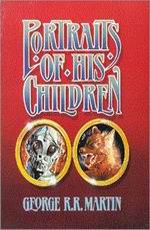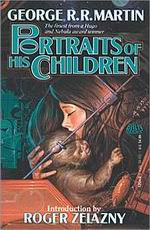|
(1987) A collection of stories by
*** Roger Zelazny
A Sketch of Their Father George R.R. Martin and I go back for well over a decade. I first got to know him when we taught a science fiction section together at the Indiana University Writers' Conference. That was where I became aware of the clearness of his vision into storytelling processes, through what I felt to be perfect analyses and critiques of everything that came across the desk. I also noted just how helpful he was to the would-be writers in attendance. It was his idea to set up extra, informal evening sessions, where we could depart from the class format and discuss anything concerning the area in which the participants were interested. He really cared about those people, and he wanted to arm them with every weapon he could for the big combat zone of professional writing. I respected him for that, and since I already respected him for things he had written I wound up the week on that attractive campus full of good feelings toward George and I resolved to follow his career. Now, I'd learned of his history in chess, both in running tournaments and in playing the game himself (he's rated Expert), I'd learned of his academic background in Journalism and I'd even learned what the two Rs stand for, during our association that week. Later, I heard that he had accepted a job teaching Journalism in Iowa. (He moved there from Chicago — he has a couple of degrees from Northwestern — and he originally hails from New Jersey.) I did not at that time know of his interest in Mississippi riverboats, a thing anyone can now see by reading his fine novel, FEVRE DREAM. Nor did I learn anything which would have caused me to anticipate his powerful ARMAGEDDON RAG, which leads me to conclude that science fiction writers themselves have, through exposure, become immune to the extrapolative process even in the hands of others of their kind. I skip over reunions at various conventions and professional functions to a later period when George quit teaching to write full-time, departed the windswept plains of Iowa and became my neighbor here in the mountain-girt fastnesses of Santa Fe, New Mexico. I have already told the story elsewhere of how he jokingly suggested I write the story — which I jokingly decided to do — that became "Unicorn Variation", one of my better-known pieces. We have eaten and drunk together on many occasions, and he gives good parties — a thing that's never been one of my own strong points — and I'll let this be my thank you note for a lot of fine times, even the one where I set off his fire alarm when I stepped out into the hallway to light my pipe. I have since known him as an exceptional editor, in his management of the complex mosaic-novel Wild Card series — which, upon reflection, I realize that only a chess expert could coordinate. I have also seen his sensitivity to another writer's work in his adaptation of my story. "The Last Defender of Camelot" as a Twilight Zone episode. Not only did he do a better job of scripting it than I could have myself, but he phoned me regularly to explain the necessity for changes (no horses on the sound stage, though we could have night there; horses out-of-doors, but not at night — too tricky to film) and to report on problems as they developed (good armor is not always that easy to come by, Stonehenge wasn't built in a day and Hollow Knights upset Special Effects people) and problems in the course of filming (why Lancelot's cane became a scarf) and disasters (the stunt man whose nose was cut off during the sword-fighting scene). I listened in awe to the problems with which he wrestled in attempting to preserve the integrity of my story, I knew gratitude for his attempts through six rewrites to save lines he could tell were favorites of mine and I was totally pleased with the result when it finally glowed into being and moved. Now I have before me the MS of this collection, and I've just finished reading through it. I'm glad that it's so good — though I don't think George capable of writing a really bad story — and I see that it contains tales from all over his career, including "The Lonely Songs of Laren Dorr" — one of the few stories by someone else which I wish I'd written. Reading through this many this way, I was impressed by his range. There are a number of good writers who are Johnny One-Notes, who tell a certain sort of story very well or use a particular type of character very skillfully, but never seem to go beyond that. This is not the case with George. His themes are as varied as his characters, and there is a temporal progression to his subtlety and complexity; that is, he continues to grow and develop, which is the life-principle for an artist. There is a certain wistfulness to "With Morning Comes Mistfall", a high poignancy to pieces such as "The Glass Flower", "Portraits of his Children", and "The Lonely Songs of Laren Dorr", madness and violence in "The Second Kind of Loneliness" and "Under Siege", and there is also humor, in "The Last Super Bowl" and "Closing Time". There is dignity and perhaps even nobility in "Unsound Variations", irony in "In the Lost Lands" and a kind of bitter-sweet fairy tale quality to "The Ice Dragon". All in all, it's an impressive array of tellings. Anyone picking up this book will get a full return on the investment. A story is, among other things, a judgment of reality. The better ones merge thought and feeling to achieve an experience of such judgments. A concern for values in the face of individual extinction and universal entropy, for example, is one of the high themes in both philosophy and literature. To deal with such a matter at all, as opposed to dispensing simple entertainments, is to reach toward the upper limits of fiction. There seem to be as many different ways of presenting the Values v. Death theme as there are writers willing to work at that uncomfortable level. The willingness to try may be what separates the artist from the hack. Look at the final conversation between Kleronomas and Cyrain of Ash in "The Glass Flower". There is a deadly, icy balancing of philosophical positions in this exchange. Here, George found the perfect vehicle for merging his thoughts and feelings on the matter. Reading stuff such as this is an uncommon experience. Behind those few pages are years of living sensitive to the forces that create and destroy, and coming up with a series of judgments. Of course, it helps to have a poet's way with words and a dramatist's ear for dialogue. But I was talking about ideas, pure judgments of reality, and their translation into fiction. George does not draw away from the greater judgments, and so achieves a background feeling of honesty in his work which separates it from the run-of-the-mill. I pause, since this is an introduction and not a dissertation, and also because I fear that too much of such talk could make him sound heavy and stuffy, which he is not, rather than graceful and engaging, which he is. I could change the subject now and tell you that George is a gentle soul, fond of cats, hats, good food and drink, music and the company of friends, that he lives in a pleasant house full of books and awards, and that he seems to be one of those people who has no enemies. I could say that, having known him as teacher, writer, editor, critic, inspirer and adapter, I am continually impressed by his sensitivity in all areas concerning writing. I could also disregard my earlier conclusion about extrapolation and perform a series of progressively brightening predictions on the course of his career. However, I feel obliged to point out that since I am prejudiced in his favor because he's a friend of mine I have subtracted lots of good things I could say about him to sort of balance things out.
Предисловие Роджера Желязны к сборнику Джорджа Мартина "Portraits of his children"
|
|||||

